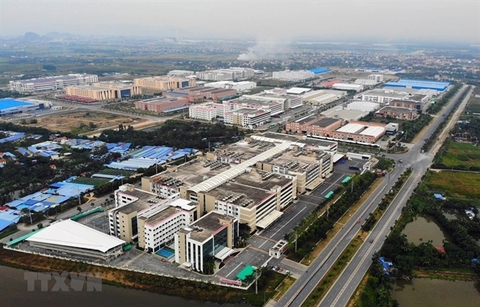
The Viet Nam-Singapore Industrial Park in Hai Phong City. — VNA/VNS Photo
The northern port city of Hai Phong has set a goal of attracting between US$2.5-3 billion in foreign direct investment (FDI) this year.
Top priority will be given to luring FDI to industrial and service projects using modern and environmentally friendly technologies, according to the Hai Phong Economic Zone Authority (HEZA).
Local authorities will focus on improving infrastructure of industrial parks (IPs) and clusters in the next five years, HEZA said.
Adjustments will be made to the master plan for the construction of the Dinh Vu-Cat Hai Economic Zone, while more IPs will be established in accordance with the city’s hopes to attract investment to the three economic pillars; hi-tech industry, seaport-logistics, and tourism-commerce.
Meanwhile, the city will also pilot the transformation of two operating industrial parks into eco-industrial parks, and deploying the model of chain-linked industrial zones to enhance connection among enterprises operating in the IPs with those outside.
In order to lure more investment, local authorities are working hard to speed up land clearance for construction of a number of industrial zones and Hai Phong international gateway port.
They are accelerating administrative reforms to facilitate operating projects in the city and those to be put into operation in the future.
Hai Phong currently needs about 22,000 high-quality employees. HEZA is building a plan to work with businesses to train staff, while the city’s manual workforce meets just 60 per cent of demand from economic zones and IPs.
The city has prioritised attracting high-tech projects to cut its workforce and is considering launching more social housing projects to accommodate employees from other localities.
Last year, the city's industrial and economic zones attracted nearly $1.53 billion from 39 new foreign-invested projects and 25 capital-added ones, up 21 per cent year-on-year.
By the end of last year, these zones lured 400 foreign-invested projects worth a total of about $16.25 billion. — VNS